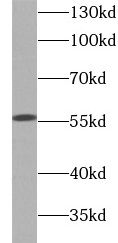Products
GPI antibody
Category:
- SPECIFICATIONS
- Product Name
- GPI antibody
- Catalogue No.
- FNab10496
- Size
- 100μg
- Form
- liquid
- Purification
- Protein A+G purification
- Purity
- ≥95% as determined by SDS-PAGE
- Clonality
- monoclonal
- Isotype
- IgG1
- Clone ID
- 4F11
- Storage
- PBS with 0.02% sodium azide and 50% glycerol pH 7.3, -20℃ for 12 months(Avoid repeated freeze / thaw cycles.)
Immunogen
- Immunogen
- Glucose-6-phosphate isomerase
- Alternative Names
- GPI antibody, AMF antibody, GNPI antibody, NLK antibody, PGI antibody
- UniProt ID
- P06744
- Observed MW
- 55-64 kDa
Application
- Tested Applications
- ELISA, WB, IHC, IF
- Recommended dilution
- WB: 1:2000-1:20000; IHC: 1:200-1:1000; IF: 1:50-1:200
Validated Images
 HeLa cells were subjected to SDS PAGE followed by western blot with FNab10496(GPI antibody) at dilution of 1:5000
HeLa cells were subjected to SDS PAGE followed by western blot with FNab10496(GPI antibody) at dilution of 1:5000
 Immunohistochemistry of paraffin-embedded human lung cancer tissue slide using FNab10496(GPI antibody) at dilution of 1:500
Immunohistochemistry of paraffin-embedded human lung cancer tissue slide using FNab10496(GPI antibody) at dilution of 1:500
- Background
- This gene encodes a member of the glucose phosphate isomerase protein family. The encoded protein has been identified as a moonlighting protein based on its ability to perform mechanistically distinct functions. In the cytoplasm, the gene product functions as a glycolytic enzyme (glucose-6-phosphate isomerase) that interconverts glucose-6-phosphate and fructose-6-phosphate. Extracellularly, the encoded protein (also referred to as neuroleukin) functions as a neurotrophic factor that promotes survival of skeletal motor neurons and sensory neurons, and as a lymphokine that induces immunoglobulin secretion. The encoded protein is also referred to as autocrine motility factor based on an additional function as a tumor-secreted cytokine and angiogenic factor. Defects in this gene are the cause of nonspherocytic hemolytic anemia and a severe enzyme deficiency can be associated with hydrops fetalis, immediate neonatal death and neurological impairment. Alternative splicing results in multiple transcript variants.



